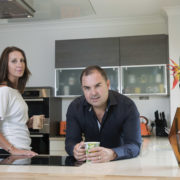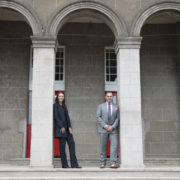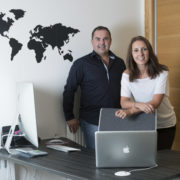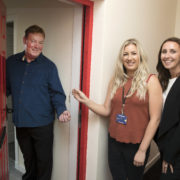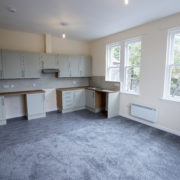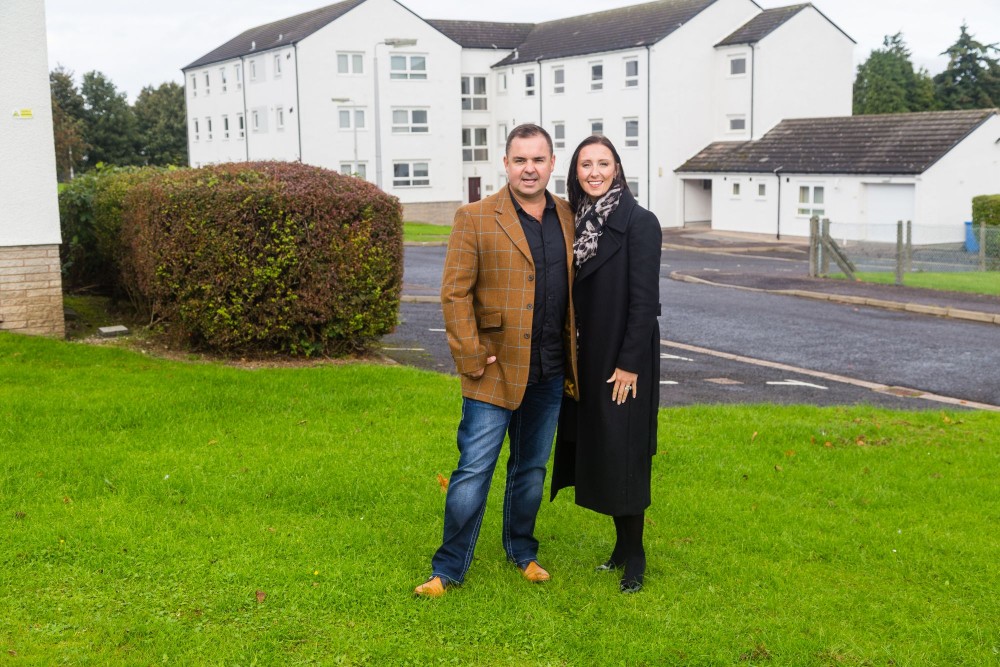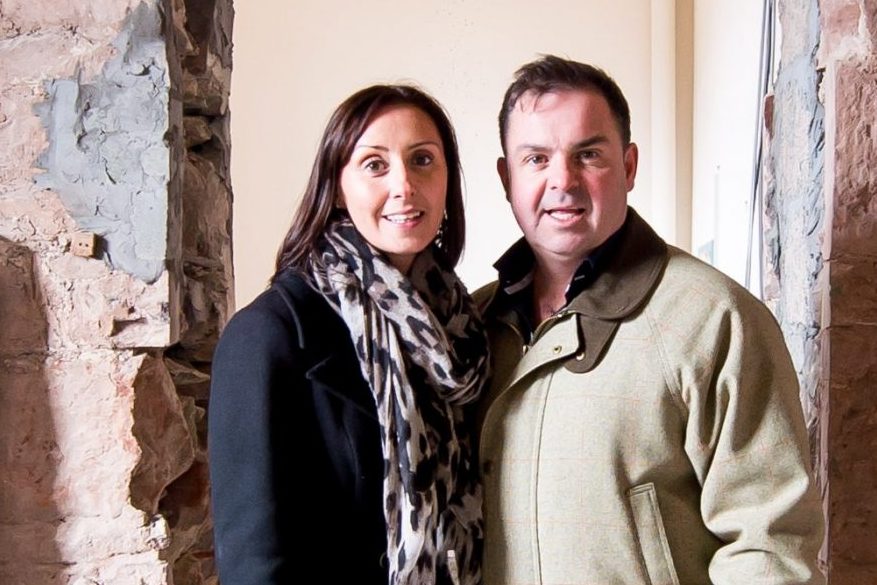Me, my scared self and I: The lessons I learned from my fear of heights
Why would someone with a serious fear of heights attempt two of the world’s scariest challenges? For entrepreneur Graeme Carling, tackling both wasn’t so much a test of his mettle as a chance for some serious navel-gazing.
I’ve been afraid of heights since I was eight years old. I can’t pinpoint why or how it started. And looking back, it doesn’t make much sense.
My family had lived in a multi-storey block until then, and I had negotiated lifts and stairs without any problem. When I was eight we moved to a bungalow and, apparently from nowhere, the fear set in.
But as anyone who knows me will tell you, I tend to not like things standing in my way. If there’s a hurdle, I want to either jump over it or kick it down. And I believe that if you’re going to grow and expand, both personally and in business, you need to set yourself serious challenges.
That’s why, a few years ago, I found myself at the top of Stratosphere Tower in Las Vegas, ready to take part in its famous SkyJump. A fall of 829 feet, it holds the Guinness World Record for highest commercial decelerator descent.
But when it came to letting go, I couldn’t. I gripped onto the railing, my knuckles just about popping out of my skin, and I couldn’t budge. Gutted, I turned around and left, moving down the 107 floors the traditional way – by lift. I was gutted. They gave me a ‘chicken voucher’ which allowed me to do the jump again at no cost.
Late last year, I returned. I wasn’t any braver but I was absolutely determined. I had flown over to Las Vegas from Scotland solely to do the SkyJump. That said, when the time came I looked for any excuse to not have to try it again. Maybe the weather wouldn’t be great. If we turned up early enough, maybe the place would still be closed. I was giving my wife Leanne all sorts of reasons to not do it, even on the way up in the Stratosphere lift.
Leanne came along to do the jump with me, offering her moral support. She took it all in her stride, including matter-of-factly leaping off the side. My own jump (yes, this time I did do it) was a whole lot different. It was captured by the wrist-cam I wore on the way down, and my screaming, swearing and panicked face say it all.
Two months later I was at an even higher elevation, this time climbing Mount Kilimanjaro – the tallest free-standing mountain in Africa. Again, this was a second attempt. The first time around, I’d had to turn back just 500 metres from the summit. The lack of oxygen – half of what there is at sea level – had hit me hard. Altitude affects everyone differently. For me, it was dizziness and breathlessness, a high heart rate and blood pressure, and then fainting. You’re told when you get your pre-climb briefing that if your team doctor says you should descend, it’s not negotiable. So when our expedition doctor told me to turn back, I had no choice.
In February of this year I tried Kilimanjaro again. And, yet again, it looked like I wouldn’t make it. Altitude sickness hit me exactly as it had the first time, and at exactly the same height. I could see the summit, but my body decided it didn’t want to go there. This time, though, the expedition doctor gave me the all-clear, saying I was fine to keep going up.
Like the Stratosphere Tower jump, Kilimanjaro was a personal challenge for me. I felt exhilarated when I reached the summit. There was the beauty of watching the sunrise on top of the world. And it was a surreal feeling, knowing I had managed to overcome something that terrified me.
What these experiences did, apart from push me to my physical and psychological limits, was make me do some naval gazing. Why did I want to put myself and my fear of heights through such hell? And twice!
As much as I fear heights, I fear not being able to complete a task I’ve set my heart on. It isn’t about failure. I’ve done plenty of failing as a businessman and entrepreneur and I firmly believe that failing makes you much more resilient. ‘Fail faster’ is my personal motto. As long as you’re willing to learn from it, get back up again and not dwell on it, failing – particularly if you’re in business – can be a great thing…provided you don’t repeat it.
It boils down to this: I don’t like being told that I can’t. Say ‘No you can’t’ to me and I’ll say ‘F*** you I can’ back. People have described me as terrier-like for both my enthusiasm and my stubbornness when it comes to seeing something through. And I realise it’s a big reason I went into business to start with – a personality trait that keeps me excited about new ventures, both my own and other people’s.
My stubbornness takes me off the beaten business path. In 2008, when the market crashed, everyone was getting out of property investment and telling others to do the same. I used loans, leverage and debt to start building up a property portfolio that, today, makes me and Leanne the biggest private landlords in Scotland.
It keeps my eyes open to new business possibilities. I’ve recently chosen to explore some new business avenues, among them oil and gas and dentistry. I’m also substantially expanding our property businesses. For me, they present enough unknowns to keep things edgy, and keep me excited. A bit like jumping off that tower in Las Vegas.
As you can imagine, with both SkyJump and Kilimanjaro ticked off my bucket list, I need another challenge. So I’m already preparing for Mount Everest in November
Why ‘rent’ shouldn’t be a four-letter word
A recent report claiming millennials are facing a lifetime of renting should have been welcome news for property developer and private landlord Graeme Carling. But he has concerns.
Being a business investor, property developer and private landlord, I should have welcomed the recent report that millennials will rent property all their lives.
According to the Resolution Foundation, up to a third of millennials in Britain will rent property, as opposed to buying, from cradle to grave. The report demands reforms in the private rental sector, from rent control to strengthened contracts. And there’s a nod to Scotland where, thanks to new tenancy rules brought in last year, some of this is already happening.
As a long-time affordable housing provider, I support the report’s recommendations. But I’ve been reading the accompanying news stories with interest.
I’m fascinated by how the rental sector is treated, by the public and by the media. In everything from casual conversation to newspaper reports, when it comes to stories about people renting their home, the language is subtle, the message clear. Renting is frowned upon, while home ownership is held up as some sort of holy grail. Renters are spoken of in whispers, almost pityingly (‘Poor them, they’re still renting!’) Advice columns and personal finance pages are filled with tips on buying property or helping a loved one buy. Even the phrase ‘property ladder’ implies there’s something to escape, and if we’re not careful we’ll fall back into it. Adverts for banks, loans and savings schemes detail all the latest incentives to help us hit that first rung, move ‘up’ and leave this nasty renting thing behind us.
How did Britain get to the stage of treating living in rented accommodation as second-class and so unappealing?
As rental sector models in mainland Europe and the USA prove, it’s more than just OK to rent. When the transaction between the tenant and landlord works, it works well.
The idea of building properties solely for rental purposes is at last gaining some traction among developers here in the U.K. That’s great news for tenants; who doesn’t want a reliable washing machine and wi-fi, and the security of knowing the place won’t be sold from under you?
It’s also good news for us private landlords who are serious about what we do. Because if renters crave stability and security, so do we.
It frustrates me that nine out of ten of the U.K.’s private landlords own just one property. It frustrates me even more when I hear of tenants who can’t get a roof repaired or a boiler serviced because the landlord can’t afford it or, worse, can’t be bothered.
Letting out properties shouldn’t be the cottage industry it has become. If, as the Resolution Foundation demands, we are to address the U.K.’s housing crisis, lack of housing stock and spiralling rents, we need a shake-up of private landlords.
In Scotland, things are going in the right direction. The extra costs incurred by the recent Land and Buildings Transaction Tax seem to be putting the squeeze on buy-to-let investors; there is evidence that part-time landlords are pulling out of that market. The new Scottish Private Residential Tenancy, which balances out the power between tenants and landlords, will surely have a similar effect.
But I think more could be done. Compulsory property factors to oversee common repairs is one example. Another is means testing for landlords and agents to show they’re financially able for long-term property management.
Renting is here to stay, and a massive cultural shift is ahead of us. It’s time public perception changed, and private landlords stepped up to the plate. All of us need to start treating renting seriously.
- This opinion piece appeared in The Herald.
Scotland’s largest independent private landlord speaks out on ‘cradle-to-grave’ renting
Scotland’s largest independent residential landlord has spoken out on one of the property sector’s hottest topics – so-called ‘cradle-to-grave’ renting.
In an article in today’s Herald newspaper, Graeme Carling, co-founder of Carling Property Group, slams the negative way in which renting is perceived by members of the public and the media.
“In everything from casual conversation to newspaper reports, when it comes to stories about people renting their home, the language is subtle, the message clear. Renting is frowned upon, while home ownership is held up as some sort of holy grail,” he writes, adding: “Even the phrase ‘property ladder’ implies there’s something to escape, and if we’re not careful we’ll fall back into it.”
Graeme applauds a recent report from the Resolution Foundation which demands reforms in the private rental sector. And he sets out his views on how he thinks private landlord regulations could be tightened up to address “part-time landlords”.
But he cautions: “Renting is here to stay, and a massive cultural shift is ahead of us. It’s time public perception changed, and private landlords stepped up to the plate. All of us need to start treating renting seriously.”
Graeme’s comments came in the same week that he announced the opening of a new affordable housing development, in Angus. Funding for the £900,000 project, which features apartments and, still to come, houses, came partly from a £300,000 grant from the Scottish Government’s Rural Housing Fund, which aims to increase the supply of affordable housing in rural Scotland.
Carling Property Group, run by entrepreneurs Graeme and Leanne Carling, owns and manages 350+ rental properties all over Scotland, making it Scotland’s largest private residential landlord. The Carlings also head up United Capital, a new player in the financial investment sector.
Read the full article in The Herald here.
Carling Property Group receives award shortlisting for “outstanding” project
Property and investment firm Carling Property Group has been shortlisted in the prestigious Shelter Scotland Howden’s Champion of the Year Awards for a project which converted a former Perthshire school house into affordable housing.
Carling, which has made it a mission to fill the gap in affordable accommodation in Scotland, joins a record number of nominations for the awards. The winners will be announced next week at the Scottish Empty Homes Conference in Glasgow.
Carling Property Group, owned by entrepreneurs Graeme and Leanne Carling, turned the derelict St. Stephen’s RC Primary School in Blairgowrie into eight apartments, complete with secondary glazing, new flooring, private parking and disabled access.
The conversion has been shortlisted in the Outstanding Project category of the awards, which showcase exemplary contributions to private sector empty homes work in Scotland.
The properties are being let through the Perth and Kinross Council-run PKC Lets. CPG made history by being the first private property developer to receive affordable housing support from the Scottish Government for the apartments. The Tayside firm qualified for a six-figure sum from the Scottish Government’s Rural and Islands Housing Fund.
The Annual Scottish Empty Homes Conference takes place at The Lighthouse in Glasgow on 15th November 2017.
To find out more about Carling Property Group visit www.carlingpropertygroup.com
Carling Property Group welcomes first residents to St. Stephen’s new apartments
Eight new residents have received the keys to their new apartments in a former old school house in Blairgowrie.
Carling Property Group’s latest affordable housing project is a set of seven one-bedroom properties and one studio apartment occupying the former St. Stephen’s RC Primary School.
The Blairgowrie apartments, with rents starting at £250 a month, are being let through the Perth and Kinross Council-run PKC Lets.
Priority for applications was given to those working in the local area, over-55s and applicants with medical needs. There was strong interest in the new apartments, which feature secondary glazing, new flooring, private parking and disabled access. Enquiries came from a wide range of people including working professionals and retirees, demonstrating the demand for affordable accommodation in Blairgowrie. All the potential tenants who were given a ‘first look’ of the properties were delighted with the accommodation and quick to snap them up.
Kayley Hallgarth from PKC explains; “Within a day of having the flats advertised we became inundated with calls and e-mail enquiries with people looking to view the flats straight away. They have been extremely popular. We had our first tenant signing and moving in within 5 days of viewing the flats.
I think the Old School House conversion has not only transformed an empty building and brought it back to life but it has also provided people within the local community good quality, affordable housing. The flats have been made to a very high standard giving all the tenants very modern, bright and spacious living areas, whilst keeping the traditional character of the building which is really nice to see.”
George Retrick was welcomed to his new home by Leanne Carling, co-founder of Carling Property Group, and Kayley Hallgarth, PKC Lets Private Sector Officer.
Already an established Blairgowrie resident, George is downsizing from a larger property in Rattray, which was proving difficult to keep warm over winter.
“I’m so much closer to family now, with my sister living just around the corner,” said George. “This flat will be easier to keep heated, and it’s much closer to the facilities in the town centre. It’s perfect for me.”
Funded partly by the Scottish Government’s Rural and Islands Housing Fund, which helps change buildings into homes, the new properties offer much-needed affordable housing in Blairgowrie.
Carling Property Group makes history with affordable housing partnership with Scottish Government
Property and investment firm Carling Property Group has made history as the first private property developer to receive affordable housing support from the Scottish Government.
Carling Property Group (CPG), whose mission is to fill the gap in affordable accommodation in Scotland, qualified for a substantial six figure sum from the Scottish Government’s Rural and Islands Housing Fund. CPG has used the money to convert a former old school house in Blairgowrie, Perthshire into eight properties, complete with secondary glazing, new flooring, private parking and disabled access.
The new properties at the former St. Stephen’s RC Primary School mark the latest affordable housing project for CPG, which also counts student and senior housing among its ventures. CPG is currently at work converting the former Chance Inn in Inverkeilor, Angus into affordable housing rentals.
CPG is believed to be the only private property developer to have received RIHF money. It has also worked with the Scottish Empty Homes Partnership on the Blairgowrie project, with SEHP providing support with grant and property applications.
Graeme Carling, co-founder with wife Leanne Carling of Carling Property Group, said the Blairgowrie properties were already attracting interest, proving that demand continues to be high for affordable housing across Scotland.
Graeme said: “We are delighted that the Scottish Government, via its Rural and Islands Housing Fund, has supported a private developer for the first time. As we expected, there has been strong interest in the apartments. This clearly demonstrates the need for more affordable housing in the area, and in Scotland. We remain committed to helping fill this gap but, sadly for those seeking affordable accommodation, there is still much work to be done in this sector.”
Graeme Brown, Director of Shelter Scotland, which hosts the Scottish Empty Homes
Partnership on behalf of the Scottish Government, said:
“The conversion of this former school is a fantastic example of how empty properties can be part of the solution to Scotland’s shortage of affordable homes. Particularly in more rural communities it can be much more cost-effective to renovate existing empty homes or convert empty non-residential buildings to housing rather than start building from scratch on a greenfield site.”
CPG’s project in Blairgowrie features seven one-bedroom and one studio apartments, with rents starting at £250 a month. The properties are being let through the Perth and Kinross Council-run PKC Lets. Priority is being given to those working in the local area, over-55s and applicants with medical needs.
Carling Property Group enters student market with affordable rentals
Property and investment firm Carling Property Group has entered the student accommodation market with the acquisition of Alloway Halls, formerly owned by Abertay University. The Dundee-based company is to turn the halls of residence into affordable student housing, with rents at a lower rate than when the University owned them.
Announcing the news, owner Graeme Carling invited John Alexander, Convenor of Neighborhood Services, to view the property, now called Kingsway Apartments. The price for the halls is £75 per week.
With more than two decades in property development and investment, Graeme and wife Leanne are now Scotland’s largest private residential landlords and are making a name for themselves in delivering quality affordable private sector housing to the Scottish rental market.
Graeme Carling, co-founder of Carling Property Group along with Leanne, said:
“There is a distinct shortage of quality, affordable housing in Scotland, including in the student market. We believe our acquisition of Alloway Halls and the rental rates we are setting will go a little way to addressing that issue in Dundee.”
“We had a number of ideas for what to do with the property, but then spotted a gap in the market for good accommodation for students that is not outside of their reach financially. We’re excited to be dipping our toe into the student market.”
John Alexander added:
“Demand for decent, affordable housing in Scotland is at an all-time high, and with reports showing that demand is outstripping supply, it’s heartening to see investors like the Carlings trying to fill a much-needed gap. The Kingsway Apartments project is proof that quality needn’t be compromised in return for affordability.”
Carling Property Group owns and manages 350 rental properties all over Scotland with most in the Dundee and Arbroath area. The company is on course to increase its portfolio to 1,000 properties within the next five years.
Carling Property Group acquire Alloway Halls in Dundee and become Scotland’s largest independent residential landlord
Dundee property and investment firm Carling Property Group has this week confirmed the acquisition of Alloway Halls in Dundee from Abertay University in a seven figure deal that sees them take the lead as Scotland’s largest independent residential landlord.
The 148 tenancies secured in the purchase of the building, takes Carling Property Group’s portfolio to over 350 properties making them the biggest independent group in Scotland and one of the biggest in the UK.
The Group last year took the award for Most Outstanding Affordable Housing Provider in the UK 2015 at the UK Over 50s Housing Awards and this latest addition to their portfolio puts them firmly on track to own 1000 properties within the next 5 years.
Graeme Carling, co-founder of Carling Property Group, commented:
“We are delighted to have successfully acquired Alloway Halls from the University of Abertay who were an absolute pleasure to deal with. This is a significant purchase for our business and is part of a multi-million pound plan for the site. There’s a tangible shortage of quality affordable housing in Scotland, and a collection of well-maintained properties like this will help us to plug that gap.”
“The residential property investment market is a volatile landscape for small operators at the moment and, with the introduction of new tax changes, investment in this sector will undoubtedly become increasingly difficult. As a sustainable business with the intent to provide affordable housing at our core, Carling Property Group believe scale is vitally important to ensuring the future of affordable housing in the UK providing good quality and value for tenants and we’re well on track to achieving those aims.”
Situated to the north of Dundee, Alloway Halls were built by the University in the 1980s and enjoy excellent views of the Sidlaw Hills with easy access to the main travel routes in to and out of the city centre. They were refurbished by the University in recent years and, as well as the student accommodation blocks of which there are three, the purchase also includes two on-site three-bedroomed caretakers bungalows.
The deal was part financed by The Bank of Scotland, and overseen by McVey and Murricane in Glasgow, one of Scotland’s largest conveyancing practices.
News: Historic building gets luxury makeover in latest development from Carling Property Group
Dundee property and investment firm Carling Property Group is putting the finishing touches to its latest development project: a set of seven luxury apartments that will occupy a historic B listed building in Arbroath.
The Bank of Scotland building on Brothock Bridge dates back to the 19th century. In converting the upper two floors from offices into flats, Carling Property Group has retained all of the original features, as well as added upscale insulation, noise protection and heating systems. Bank of Scotland will continue to occupy the ground floor.
At the same time, Carling Property Group has just submitted plans to Angus Council for an upscale community for seniors in Inverkeilor. New Chance Inn Court will feature eight one-storey homes at the rear of the former Chance Inn, which itself is being converted into seven affordable housing rentals by CPG.
The Brothock Bridge and New Chance Inn Court developments mark a period of strong growth for the company, owned by husband and wife Graeme and Leanne Carling. They also signify a shift in the firms focus from providing primarily affordable housing, something the couple says was inevitable given the challenges of that market for private developers.
Plans for Carling Property Group to convert the former St. Stephens RC Primary School in Blairgowrie into affordable housing recently fell through after CPG’s application for £400,000 in funding from the Scottish Government’s Empty Homes Loan Fund was unsuccessful . CPG has now put the property back on the market.
Graeme Carling, co-founder of Carling Property Group, commented:
We still see a shortage of quality affordable housing in Scotland, but as a privately funded company we require some financial support to help us to do that. We’re disappointed we had to abandon the St. Stephen’s project because that means overall we are unable to supply 25 affordable housing units for the people of Perthshire, Dundee and Angus. We may never get to the bottom of why we didn’t qualify but what is absolutely certain is that these homes have been lost as affordable housing.
We had hoped to turn the Brothock Bridge flats into affordable rental properties too, but we can only do that if financial assistance is available through the Government, which in turn helps subsidise long-term discounted rent. So instead we will be putting them up for sale and positioning them for high-end buyers.
That said, despite these challenges, we continue to be highly focused on the section of the population that needs affordable housing. We continue also to be on the lookout for existing properties to renovate.
Carling Property Group owns and manages 200 rental properties all over Scotland, with most in the Dundee and Arbroath area. The company is on course to increase its portfolio to 1,000 properties within the next five years.




